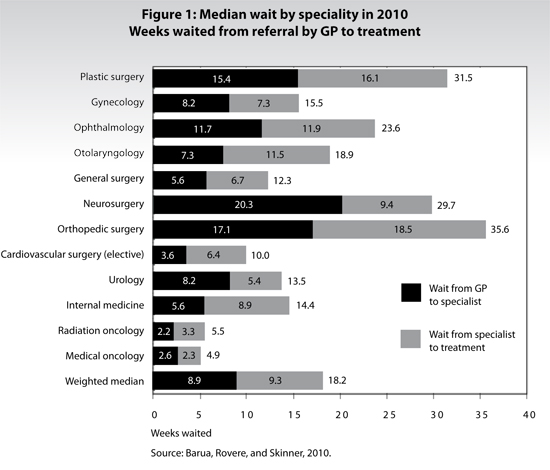Long Waits Cost Canadians Millions
More than 825,000 Canadians were waiting for some type of treatment after seeing a specialist in 2010. Once seen by a specialist, the average wait until they were treated was about 9.3 weeks according to a report by Nadeem Esmail of the Fraser Institute (see “Weighted median” wait in chart below).
According to Esmail, Canadians spent more than 10 million weeks waiting for treatment in 2010. The estimated value of working hours lost waiting was $912 million or about $1,105 for each of the 825,827 people waiting for care. This figure increases to $3,384 if evenings and weekends are included in the calculations.



More than half a year’s wait for orthopedic surgery… I have no idea what wait times for similar procedures are in other countries, but that still sounds like a ridiculously long wait time to me.
The waits are coming here. Just wait. No pun intended.
Nadeem Esmail also calculated the cost of lost productivity for those with debilitating conditions. It was more than $10,000 per person affected.
I assume people die because of this.
Comparisons between the US, and other countries which have universal health care, show that the US spends 1 1/2 to twice as much on health care for mediocre results, while leaving a large percentage of citizens without insurance coverage, or with inadequate coverage.
Unable to dispute this major point, opponents of universal health insurance bring up the subject of waiting times in Canada, the UK or other countries as an argument against universal health insurance. However no statistics on waiting times in the US are cited, because no systematic data is taken. People do wait for specialist care in the US also. In the US, the wait is often very long for primary care visits, and many have to seek costly treatment in emergency rooms, which are closing because the ER is a money losing proposition for hospitals.
There is a triage system in Canada, so that patients with less critical needs wait longer for treatment. These waits may be longer than in the US depending on the region and the supply of specialists. There is no such triage system in the US, and it is estimated that between 18,000 and 45,000 uninsured people die from lack of medical care.
http://www.pnhp.org/excessdeaths/health-insurance-and-mortality-in-US-adults.pdf
http://articles.cnn.com/2009-09-18/health/deaths.health.insurance_1_health-insurance-david-himmelstein-debate-over-health-care?_s=PM:HEALTH
Finally, the US medical care system has the highest rate of preventable deaths of any industrialized country:
http://www.reuters.com/article/2008/01/08/idUSN07651650
Yes, the Canadian Medicare has a minor pimple, while the US Health Care is bleeding to death. Canadians hate the pimple, but want to keep their Medicare. In the US 45% are very dissatisfied with their care. In Canada 13% and the UK 19% are very dissatisfied.
http://www.gallup.com/poll/11899/us-trails-canada-britain-healthcare-ratings.aspx
Note that losses from waiting lists are typically not included when U.S. health care costs are compared to those in other countries despite Danzon’s early paper showing that the added costs from waiting could be huge.
@ Linda Gorman
July 1, 2011 at 10:04 am
If you want to include waiting times as a cost, then how about the unnecessary deaths in the US for lack of access to health care, as well as waiting times in the US? Can you come up with a figure in dollars?
If you would like to add the imputed cost of waiting times, to the calculation of Canadian health care costs go ahead. It amounts to about $50 per capita, an insignificant amount. As of 2005, Per capita health care expenditures in the United States were almost double those in Canada ($6,401 vs. $3,359). The cost of waiting times are a drop in the bucket compared to the difference.
http://www.epi.org/economic_snapshots/entry/webfeatures_snapshots_20071205/
My mom went to the emergency in Windsor CA with a broken leg yesterday. So far we have no idea when she will undergo orthopedic surgery and when we talk to the people at the hospital they say they have no idea either. We are being told that this is the common process in Canada. My mother is 70 years old and has a number of other complications. We are very concerned that at her age being immobile on the bed for so long with a broken leg being drugged up for pain will cause other issues. We have been to third world countries where there is better care. This is absolute shock for us.